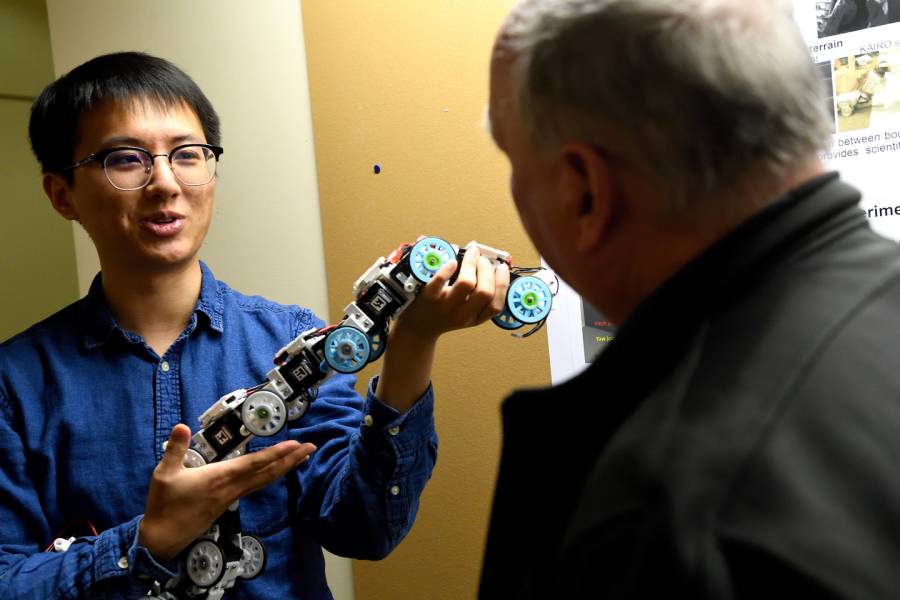The Whiting School of Engineering's Laboratory for Computational Sensing and Robotics showcased its faculty and students' cutting-edge research and industrial partnerships at Robotics Industry Day, held last week on the Homewood campus.
Representatives from top companies and organizations, including Intuitive, Auris Health, Philips, Verb Surgical, Siemens, and IMMY Inc., attended the annual day-long event that highlighted work in areas such as medical robotics, human-machine systems for manufacturing, and extreme environmental robotics through talks and more than 40 posters and demonstrations.
"This day, which brings people in from the outside to look at and learn about the impressive things we are doing in robotics, is one of the highlights of my year," said Larry Nagahara, the Whiting School's associate dean of research, as he welcomed the more than 120 participants to the Glass Pavilion. "I want to encourage all of you to interact with students and faculty, talk about the new ideas and innovations on both sides, and create partnerships to move these ideas forward."
Such a partnership is what brought Doug Magyari, CEO of Michigan-based IMMY Inc., to Robotics Industry Day. IMMY designs and builds lensless augmented reality and virtual reality glasses that emulate the human vision system. He is working with LCSR's Peter Kazanzides, a research professor in the Department of Computer Science.
"In order for our AR/VR glasses to perform their best, they have to be calibrated properly, and that's why we are here," said Magyari. "Peter and his team have been working on calibration methods so that when you look inside the wearable video glasses, they are tuned to your own vision system. We are going to engage with the university on several programs in applying not just calibration methodology, but applying this to medical applications, and getting a great user experience."
This year's event focused on students, who presented talks about their research, and alumni, some of whom offered advice to current students about the next phase of their careers.
Ameet Jain, who received his PhD in 2007 and is team lead and senior scientist at Philips Research North America, discussed how he made the decision to join industry, rather than to pursue a job in academia.
"As a student, I had many anxieties around that decision, and I figured that some of you may be struggling with that, as well," said Jain. "The primary reason is that I was drawn to industry was that I wanted to learn and understand—and be part of—taking a great idea and seeing it commercialized to make great clinical impact."
Amy Blank, who received her PhD in 2013 and is now a senior robotics engineer at Boston-based advanced robotics and medical devices manufacturer Barrett Technologies, also shared thoughts about her career trajectory.
"I'd always intended to go into academia," she said. "But during my time as a post-doc at Rice University, one thing I realized is that I was training students to work with robots, but almost never got to work with them myself. So my biggest reason was wanting to put to work everything I had learned in a real hands-on way."
Posted in Science+Technology, Student Life
Tagged robotics, computer science, career









